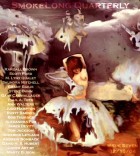This story, “Whitman Waits…” is different in tone and style from other work of yours. Where did it come from? What inspired it?
Well, it came from a clipping I’d cut out of a magazine, a mini-review of a book called Lincoln and Whitman. It mentioned that Whitman, when he lived in Washington, DC, was in the habit of standing beside the road when Lincoln’s carriage passed bound for his summer retreat. The two men never spoke, just exchanged solemn nods, and I’m not sure Lincoln ever knew who Whitman was.
Anyhow, the image of that grabbed hold of me.
Your novel-in-progress, The Malone Chronicles, won the Eugene Walter Award honorable mention for its first 100 pages. Tell us a bit about the work.
The Malone Chronicles is a first-person, picaresque novel about a young boy who, in 1939, flees his rural home after the death of his mother. It’s a tale of the open road and of crossroads and of coming of age and so on.
I’d been struggling with a long short story about an old woman who journeys home to reckon with the past, a difficult one to write. When I finished, I was glad to be done with it, but about a week later I awoke with a couple of sentences and a voice in my head: “Hush,” says Maggie, “Mama is sleeping. Don’t you know that, George?” After that the work began.
What childhood or life experiences, if any, do you think contributed to your becoming a writer?
Hmm. I can remember, back in the first or second grade, words swimming around my brain. I would take them apart and put them back together again. But I had an impediment when it came to spoken language. This was frustrating because I understood language fairly well (and read it well, too), but the speaking of it was a pain in the ass. To this day I have this strange feeling of diffidence when I speak.
That’s interesting. What did you like to read and when did you start writing fiction?
Oh, I read everything I could get my hands on: comic books, adventure stories, soup can labels and so on. I went through phases—and I don’t regret any of them. I was a very bad student, but at the same time I read voraciously for pleasure.
I wrote a few stories as a young child—and when I was in high school I had a teacher who pressed a library copy of A Connecticut Yankee in King Arthur’s Court into my hands one day and suggested that I might like to read it. Later he loaned me his paperback copy of Catch 22. And then one day he gave me a composition book and told me he thought that I could one day do what the author of these books did. It’s strange to think of this now because as you know I composed on a typewriter and then a word processor all these years and now all of a sudden I find myself writing a novel in longhand in composition books identical to the one he gave me that day.
Just out of curiosity, what was the most recent live theatre you attended?
Funny you should ask because just this past weekend I saw a theatrical talk show in Atlanta. “Alive in Little 5” was the name of it and it was great fun. The host did his opening monologue schtick and then sat down at a desk with his vulgarian sidekick and they had guests and everything—and the first one was very cute! She was a writer who talked about her work and her life and I found myself swooning something awful…
(Editor’s note: “Alive in Little 5” is presented the first Saturday of every month at the Seven Stages Theatre in Atlanta. New guests each show.)



 The SmokeLong Grand Micro Contest (The Mikey) is now an annual competition celebrating and compensating the best micro fiction and nonfiction online.
The SmokeLong Grand Micro Contest (The Mikey) is now an annual competition celebrating and compensating the best micro fiction and nonfiction online.